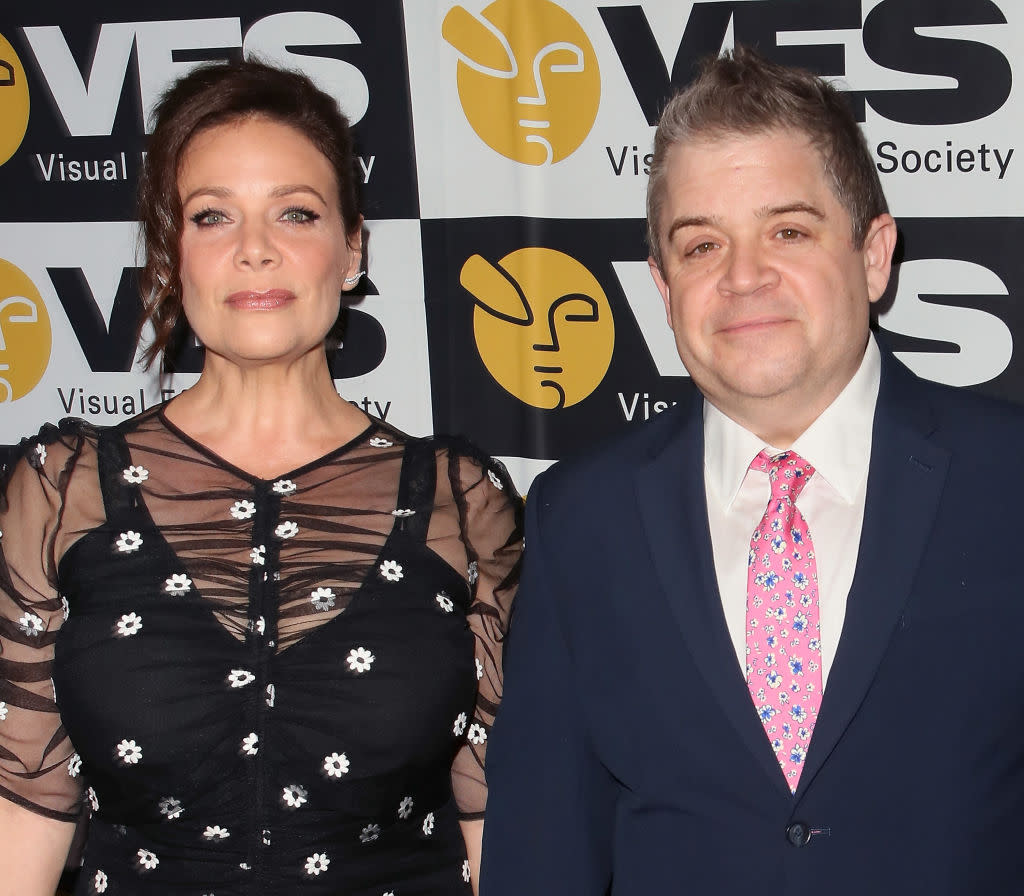Patton Oswalt's new wife praising his late wife might seem 'awkward' — but it's also inspiring

Actress Meredith Salenger was the object of much public scrutiny when she married comedian Patton Oswalt last year — as many people (who don’t know the actors personally) opined that he remarried too soon after first wife Michelle McNamara’s sudden death in 2016. But as Oswalt embarks on a book tour for McNamara’s posthumously published I’ll Be Gone in the Dark, Salenger might be changing some hearts and minds. Her tweet following Oswalt’s appearance at the New York Public Library certainly touched a lot of readers.
“I’m so proud of @pattonoswalt,” Salenger wrote on Wednesday night.
I'm in awe of the abundant grace and love you've shown, Meredith. It takes a helluva secure woman to be so supportive of her husband going on and on about his previous wife. That you recognize she's part of what makes him wonderful is a great testament to your heart & character.
— Becca (@beccarebec) February 28, 2018
As dozens responded to her sentiment, she shared more about what she felt about the true crime writer.
“The truth is… were Michelle still alive, we would have been friends,” the actress said. “We actually have about 12 mutual friends. We would have met eventually. She was my kind of girl.”
While it may seem surprising to see a new wife speak this way about the woman who came before her, Kristin Meekhof, LMSW, who is the coauthor of A Widow’s Guide to Healing, says Salenger’s words likely help Oswalt and his 8-year-old daughter, Alice.
“I think it’s really great what she’s done, to be able to show that kinship and alignment with her husband,” Meekhof tells Yahoo Lifestyle. “That helps him grieve, because grief is a lifelong process and it doesn’t end when a book comes out or on an anniversary date. It was also really great for Patton’s daughter to be able to see that he is able to find someone who honors his wife’s memory.”
You are such an inspiring woman to me, as I navigate similar waters with my darling widower, whose wife was also amazing. You have really shone a light to the correct and graceful path; I know where to tread, because of you ❤️.
PS: I’ll be at the gig in Brookline tonight!
— Portia Fendeman (@PortiaFendeman) March 1, 2018
This isn’t always easy for a new spouse, or anyone else, to do.
“Death is very awkward still,” says Meekhof, who lost her own father at age 5 and was also widowed when she was 33. “Despite whatever education they may have had about grief or loss, even if they have personal experiences, there are many people who are still uncomfortable [talking about it].”
From her own personal experience, as well as the many widows she interviewed for her book, Meekhof knows that most surviving spouses and children actually want to hear people speak about the person who’s died. If friends and family are uncertain whether that’s OK to do, social media might be a good clue for them.
“A really good thing about social media is that widows or widowers can still share memories of their loved ones,” Meekhof says. “It sends a signal to others that it’s still OK to talk about their spouse.”
Oswalt has done this several times, posting essays about his grief on Facebook, and most recently sharing a photo of McNamara’s book next to her headstone on Twitter.
You did it, baby. The book is excellent, the writing brilliant. You tried to bring kindness to chaos, which was your way. #IllBeGoneInTheDark #MichelleMcNamara pic.twitter.com/xUKgEXOmR7
— Patton Oswalt (@pattonoswalt) February 27, 2018
Alice Oswalt is probably too young to be on social media, but these online exchanges will likely still be around for her to read when she gets older. Meekhof says this is something she didn’t get to experience when her father died in an age before social media. “I don’t think my mom knew how to keep his memory alive,” she laments. “The only way I got to know my father was through my paternal side of the family, through their stories and pictures.”
Public sharing comes with public criticism, of course, as Oswalt and Salenger know all too well. Meekhof has some guidance for the friends and family of the widow or widower who may have strong feelings about their remarriage.
“What is best for the widow or widower — their soul, their well-being, their life, their happiness — is something that should be supported,” she says. “If that’s a new marriage or a new career change or a change in where they live, that needs to be supported 150 percent. … When you’re chiming in unsolicited, you’re risking that person not communicating with you in the future.”
Read more from Yahoo Lifestyle:
Follow us on Instagram, Facebook, and Twitter for nonstop inspiration delivered fresh to your feed, every day.

